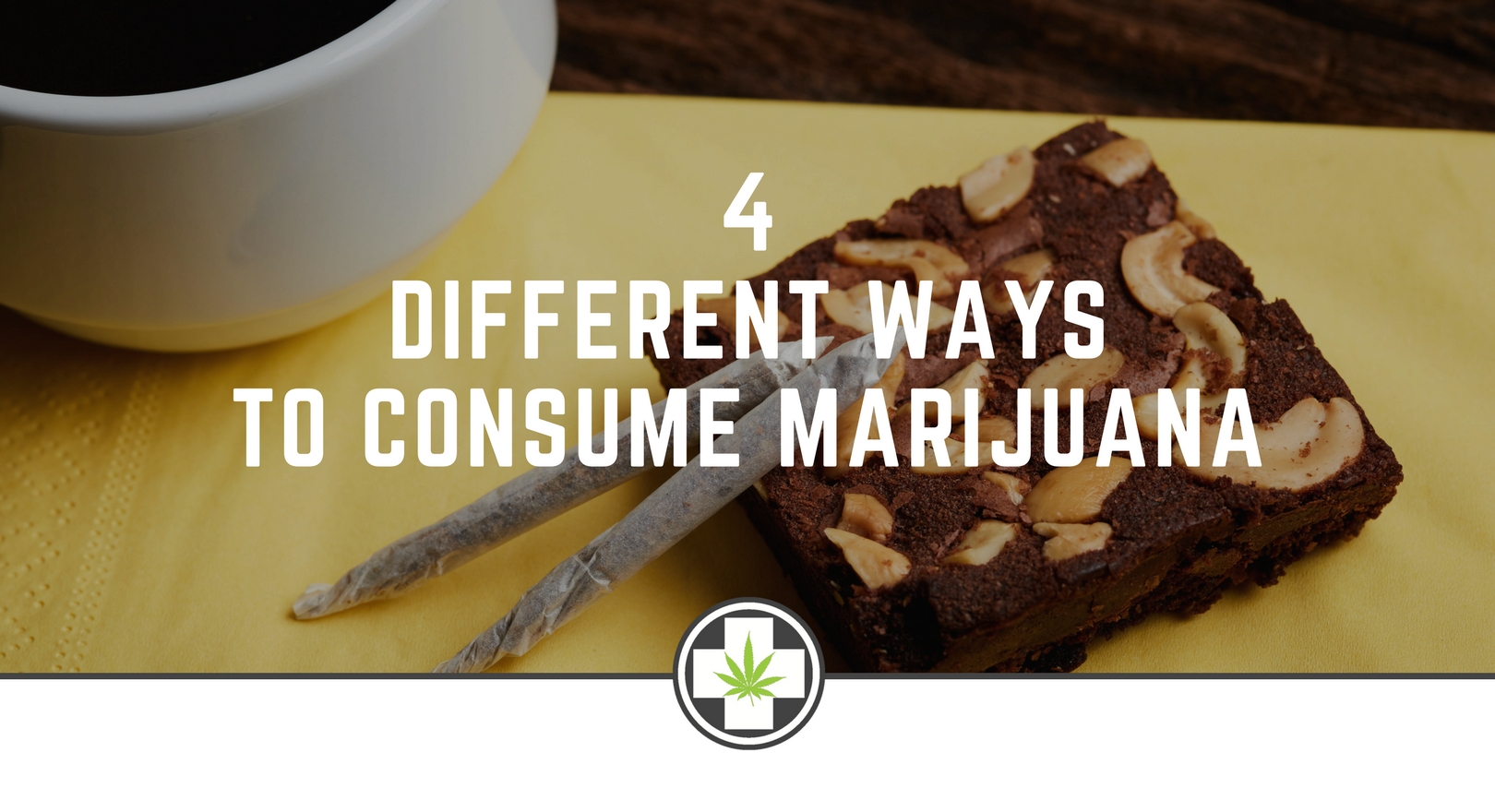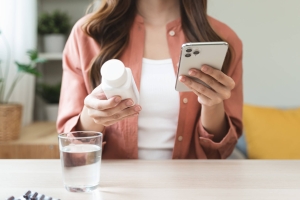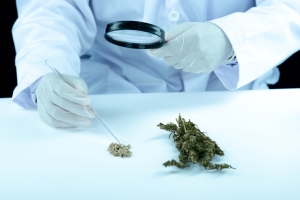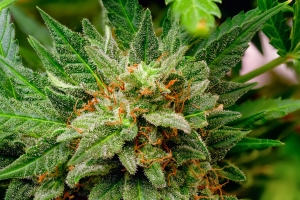4 Different Ways to Consume Marijuana
There are a lot of different ways to consume marijuana. Just take a look at your average dispensary menu, and you’ll see what we mean.
These menus can be overwhelming for new patients, especially if their experience is limited to just smoking. They may not be familiar with certain products and how they’re supposed to be consumed.
Capable dispensary staff should be able to school you on the different ways to consume marijuana, but it’s nice to have some working knowledge under your belt. That way, if a staff member tries to recommend a product you’ve never tried before, you aren’t totally in the dark.
There’s another good reason to bone up on the different ways to consume marijuana: it can help you find a consumption method that actually fits your health needs.
So we’re going to help you have your Goldilocks moment. We’re going to list four different ways to consume marijuana. We’ll also explore the pros and cons of each method. Hopefully, this post will help you find a consumption method that’s right for you.
1. Inhalation
When marijuana is inhaled, THC and other cannabinoids enters your body through the lungs and go directly into your bloodstream. You’ll typically feel the effects within minutes, peak after about an hour and come down completely after about two hours.
There are three main methods of inhaling marijuana: smoking, vaporizing and dabbing. Let’s take them one by one:
Smoking
Smoking marijuana is pretty straightforward. You expose dried marijuana to a flame, and when it ignites, you breathe in the smoke.
You can smoke using joints, blunts, pipes or bongs. Some people really push bongs because the water chamber supposedly filters out carcinogens and preserves THC.
But as we’ve argued in a previous blog post, it actually works the other way around. Bongs filter out THC and preserve the carcinogens. In fact, you’re better off smoking from an unfiltered joint than from a bong.
Although there’s no scientific evidence that occasional marijuana smokers suffer from long-term health damage, chronic smoking can irritate your throat and lungs. And if that’s a side effect you wish to avoid, you may want to consider…
Vaporizing
Vaporizing gives you the quick, immediate relief that comes from inhalation without bringing marijuana smoke directly into your lungs.
It works by heating your marijuana to a temperature of 185 degrees Celsius. This temperature is too low for the marijuana to ignite, but it’s hot enough to release the cannabinoids from the marijuana in the form of a vapor. You breathe in that good vapor, and all the bad stuff stays out of your windpipes.
Vaporizers come in different types, shapes and sizes. You can get something as a small as a “vape pen,” which you can keep in your pocket. Or you can get something bigger and more stationery, like the Volcano.
Some vaporizers only work using plant material, and others are specifically designed for concentrated marijuana oils.
A typical marijuana flower can contain anywhere from 5 to 15 percent THC. Concentrated oils, on the other hand, can contain up to 80 percent THC. This is a huge percentage gap, which is why we don’t recommend concentrates for first-time medical marijuana patients. Which brings us to our next and last inhalation method.
Dabbing
Dabbing is a powerful and controversial form of marijuana inhalation. Dabs, which also go by the nicknames of “shatter” and “wax,” are highly concentrated doses of marijuana. They can contain up to 90 percent THC.
Dabs are inhaled by applying the dab to a hot surface such as a nail. The resulting vapor is then inhaled through a dab rig.
Dabbing may be beneficial for medical marijuana patients who are suffering from severe chronic pain because the high concentration of marijuana delivers immediate effects. However, because the THC concentration is so high, we strongly recommend that (1) first-time medical marijuana patients don’t try it and (2) if you are thinking about dabbing, first consult your physician.
2. Oral
If you’re not comfortable putting anything in your lungs, other than oxygen, it’s okay. You don’t have to inhale marijuana. You can always just eat it!
Edibles
Edibles are marijuana-infused products such as brownies, cookies, cakes, oils, candies, salad dressing and plain old butter.
The way it works is simple: cannabinoids are fat-soluble, so if you cook marijuana in a fatty substance, such as butter, it will absorb the cannabinoids. You can then use that butter for baking. Or you can just slather it on a piece of toast. Your call.
How long does it take to feel the effects of an edible? Anywhere from 30 minutes to several hours. It just depends on your metabolism.
An edible high is far more intense than the high you get from smoking. It also lasts longer. If you’re eating an edible for the first time, make sure your schedule is clear for a few hours!
It’s also very easy to overdo it when you’re eating edibles. Make sure to start off with a small dose and wait a few hours before trying more. Slow and steady wins the race!
Capsules
THC and CBD also come in the form of capsules. CBD capsules can be a great option for parents who want to treat their children with medical marijuana but also want to avoid the psychoactive effects of THC.
It might be easier to manage your doses when you’re taking capsules. You don’t have to worry about cutting a brownie into even squares. With a capsule, you know exactly how much you’re getting in each dose.
Tea
“Tea” used to be an old slang term for marijuana, but marijuana-based teas are a real thing! If you’re a regular tea drinker, this might be right up your alley.
But you can’t actually steep cannabis flowers in hot water to make tea. Well…you can, but you probably won’t get much mileage out of it. Remember: marijuana is fat soluble, not water soluble.
That’s why marijuana tea bags are usually a mixture of herbal tea and marijuana-infused oil.
Raw Marijuana
Yes, you read that correctly. You can eat raw marijuana. Now whether you’d actually want to is a different story altogether!
Marijuana flowers and leaves are rich in vitamins and nutrients, which is why some patients opt to juice or blend marijuana and put it in in smoothies. They also feel that raw marijuana is more effective than its cooked counterpart when it comes to combating inflammation, diabetes and other ailments.
To be clear, the psychoactive effects of raw marijuana aren’t as powerful as smoked or cooked marijuana. That’s because THC doesn’t actually exist in raw marijuana. Instead, it takes the form of THCa, a cannabinoid acid. When marijuana is exposed to high temperatures through cooking or smoking, the cannabinoid acid breaks down, forming the THC that we all know and love.
3. Sublingual
If you don’t want to inhale marijuana but you also don’t want to ingest marijuana and wait who-knows-how-long to feel the effects, the solution is sublingual products.
These include marijuana-infused tinctures, lozenges, sprays and some types of candies. They’re meant to be applied either directly under your tongue or in the area around your gums.
Once you do this, the cannabinoids are absorbed inside your mouth and start working almost immediately. This method also allows you to exercise more control over your dosage.
4. Topicals
We did a post on topicals not too long ago, but we’ll recap here.
Topicals allow patients to apply medical marijuana directly to their skin using balms, lotions, oils, creams, topical sprays, etc.
The cannabinoids are absorbed through the skin, delivering medicine to specific areas of your body. For example, if you’re suffering from arthritis, you can apply a topical to the affected region in order to get pain relief.
Topicals are also non-psychoactive, so if you work during the day and need to use them, you don’t have to worry about becoming intoxicated.
Is That It?
This isn’t a comprehensive list of all the different ways to consume marijuana, but we hope to have at least covered the major bases.
What’s your preferred consumption method? Smoking? Brownies? Dabbing? Skin creams? Are there other different ways to consume marijuana? Let us know on Facebook and Instagram.
And if you’re currently suffering from an ailment and are ready to find relief, schedule an appointment with us today!






